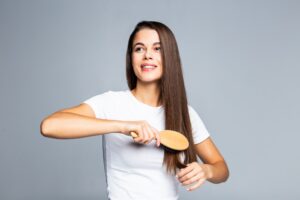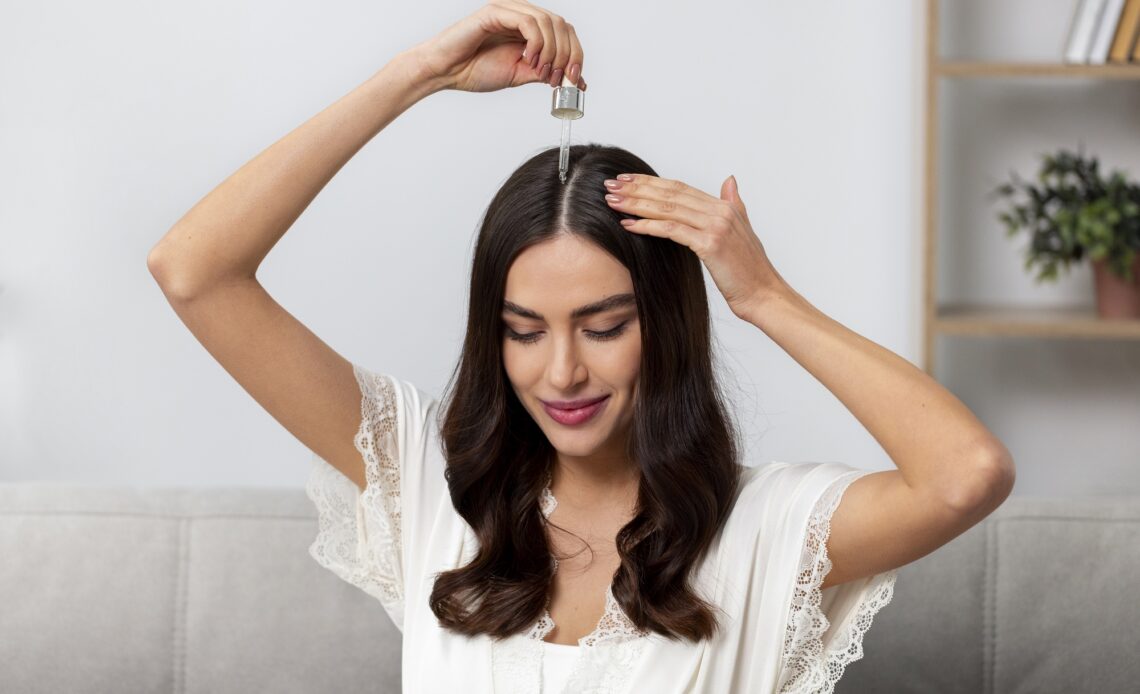Understanding the Scalp Microbiome
The scalp microbiome is a diverse ecosystem of microorganisms that reside on your scalp, playing a crucial role in maintaining hair and skin health. It consists of bacteria, fungi, and viruses that coexist in a delicate balance. Disruptions to this balance can lead to a variety of scalp and hair issues. The scalp microbiome acts as a protective barrier against harmful pathogens and environmental pollutants. Keeping it healthy helps prevent common problems such as dandruff, dryness, and hair loss.
The Importance of a Healthy Scalp for Hair Growth
A healthy scalp is crucial for maintaining vibrant and strong hair because it provides the hair follicles with essential nutrients and oxygen needed for the hair growth cycle.
To keep this environment balanced and supportive, it’s important to practice good scalp hygiene by regularly cleansing to remove buildup, follow a nutritious diet rich in vitamins and minerals that promote hair health, and use hair care products formulated specifically for your scalp type. These combined efforts ensure that hair follicles function properly, encouraging robust hair growth while preventing problems like thinning, breakage, and hair loss.

How the Scalp Microbiome Affects Hair Health
An important factor in maintaining scalp health is the microbiome, a complex community of microorganisms that work together to protect the scalp’s natural barrier and regulate the production of oil. When this microbiome is balanced, it helps prevent common issues such as irritation, inflammation, and dryness, all of which are essential for supporting healthy hair growth.
However, disruptions in the microbiome can lead to problems like dandruff, itching, or infections that weaken hair follicles and negatively affect hair quality. By promoting and maintaining a healthy scalp microbiome, you support overall scalp vitality and help ensure your hair remains strong, healthy, and vibrant.
Common Scalp Issues and Their Connection to the Microbiome
Scalp issues such as dandruff, seborrheic dermatitis, and psoriasis are often linked to imbalances in the scalp microbiome. These conditions are characterized by symptoms like redness, itching, and flakiness, which can be exacerbated by microbial disruptions.
Dandruff, one of the most prevalent scalp issues, is typically caused by an overgrowth of the yeast Malassezia. This yeast thrives in an imbalanced microbiome, leading to scalp irritation and excessive shedding of skin cells.
Addressing these scalp issues requires a focus on restoring microbiome balance. This can be achieved through targeted treatments, lifestyle changes, and the use of products designed to support microbiome health. By doing so, you can alleviate symptoms and improve the overall condition of your scalp, paving the way for healthier hair growth.
Tips for Maintaining a Balanced Scalp Microbiome
Preserving a balanced scalp microbiome is crucial for maintaining hair and scalp health. Here are some tips to help you achieve and sustain this balance:
- Choose the Right Shampoo: Opt for gentle, sulfate-free shampoos that do not strip the scalp of its natural oils.
- Avoid Overwashing: Frequent washing can disrupt the scalp’s natural oil production and microbiome. Aim to wash your hair 2-3 times a week, or as needed based on your hair type and lifestyle.
- Incorporate Probiotics: Probiotic supplements can enhance your scalp microbiome by introducing beneficial bacteria.
- Stay Hydrated: Proper hydration is essential for maintaining a healthy scalp environment. Drink plenty of water to keep your scalp and hair moisturized from within.
- Manage Stress: Stress can negatively impact your scalp microbiome. Practice stress-reducing techniques such as meditation, yoga, or deep breathing to support scalp health.
A balanced microbiome not only prevents common scalp issues but also enhances the overall appeal of your hair.
The Role of Diet and Nutrition in Scalp Health
Diet and nutrition play a pivotal role in the health of your scalp and hair. Essential nutrients such as vitamins, minerals, and antioxidants contribute to a balanced scalp microbiome and robust hair growth.
Certain foods are particularly beneficial for scalp health. For instance, omega-3 fatty acids found in fish and flaxseeds help reduce inflammation and support scalp hydration. Vitamins A and E, found in leafy greens and nuts, contribute to sebum production and protect the scalp from oxidative stress.

Zinc helps regulate oil production, while biotin strengthens hair and promotes growth. By focusing on a nutrient-dense diet, you can nourish your scalp from within, creating an environment conducive to healthy hair growth.
Products to Support a Healthy Scalp Microbiome
Choosing the right products is essential for maintaining a balanced scalp microbiome. Here are some product types that can support scalp health:
- Scalp Exfoliants: These products help remove dead skin cells and excess oil, preventing microbial imbalances. Use them once a week to keep your scalp clean and healthy.
- Prebiotic and Probiotic Treatments: These treatments introduce beneficial bacteria to the scalp, promoting a healthy microbiome balance.
- Natural Oils: Oils such as tea tree, coconut, and jojoba have antimicrobial properties that can help regulate the scalp microbiome.
- pH-Balanced Shampoos: Opt for shampoos that maintain the scalp’s natural pH level, preventing disruptions to the microbiome. These shampoos are gentle and effective for routine cleansing.
By choosing products that support microbial balance, you enhance the health and appearance of your hair.
Professional Solutions for Scalp Health
Professional scalp treatments offer advanced solutions for maintaining scalp health and promoting hair growth. These treatments are typically administered by dermatologists or trichologists, who can assess your scalp’s condition and recommend personalized solutions.
Some popular professional treatments include scalp detoxes, which involve deep cleansing to remove buildup and impurities, and microneedling, which stimulates hair follicles and enhances product absorption. Additionally, low-level laser therapy (LLLT) is a non-invasive treatment that promotes hair growth by increasing blood circulation to the scalp.
These treatments often complement at-home care, offering a comprehensive approach to maintaining a healthy scalp and fostering luxurious hair growth.
Conclusion
Nurturing your scalp is the key to unlocking the full potential of your hair. By understanding the essential role of the scalp microbiome and adopting practices that support its balance, you can enhance both scalp and hair health.
By prioritizing scalp health, you lay the groundwork for vibrant, resilient hair. The steps you take today will have a lasting impact on the health and appearance of your hair. Embrace the journey to healthier hair by nurturing your scalp, and enjoy the luxurious results.


